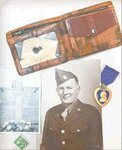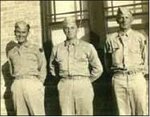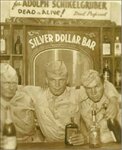


The bloodbath was over.
Cpl. William Williams and his Army battalion hit Utah Beach June 8, 1944, two days after D-Day.
The scene was apocalyptic. Hundreds of boats tossing in the choppy channel. Empty ammo cases, discarded lifebelts, helmets and pieces of clothing littering a sandy road. German bodies and slaughtered cattle dotting the landscape.
Williams, a farm boy from Neri (pronounced NEE-RYE) in southern Hood County, served as a combat medic in the European theatre in World War II.
He wrote to his parents about the lush, green countryside, the cool, rainy weather and his desire to return home and fish the Brazos River. He tried to comfort his mother, insisting she not worry, that she would see him again.
But the homecoming never happened.
Enemy gunfire took his life on the battlefield of Elzange, France on Nov. 15, 1944. He was 37.
Williams died a hero.
Capt. Ralph W. Drury wrote that Williams was killed “while performing his duties as a medical aid man, in going to the aid of a wounded comrade.
“As near as it could be determined, it was from enemy small arms fire and apparently happened very quickly, that is, there was not too much time elapsed between his being hit and his death.”
Williams is buried in an American cemetery at Lainey, France.
Drury said in his letter that combat medical men “are equally thought of as combat infantrymen. I know of no higher tribute that can be paid; may the work of him and others commend our eternal gratitude.”
Hood Countians learned of Williams’ death when reading the Dec. 7, 1944 issue of the Hood County Tablet.
ANOTHER HOOD COUNTY BOY KILLED IN ACTION was the headline followed by the story:
“Mr. and Mrs. G.T. Williams of Neri received the following telegram from the Adjutant General in Washington Sunday night. ‘The Secretary of War desires me to express his deepest regards that your son William E. Williams was killed in action in France on November 15.’”
Survivors included “his parents, three brothers, E.A. of El Paso, Hubert and Odell of Granbury, two sisters, Mrs. Johnnie Schoofield of Pampa and Mrs. Jessie Lewis of Granbury. The family has the sympathy of the entire community.”
Williams’ story was brought to light this week by Granbury military history collector Brett Quillin, a veteran himself. He keeps a busy life, working as a pastor and full-time mailman.
HUMBLE HISTORIAN
Quillin isn’t seeking publicity for himself. He didn’t want his photo taken, and he wanted his statements kept to a minimum. He said the focus should be on William Williams.
“This guy paid the ultimate sacrifice for us,” Quillin said.
Quillin acquired a box containing photographs of Williams and his comrades, and condolences from the military and politicians to Williams’ parents. Williams’ handwritten letters home were also among the items. His Purple Heart medal and even his worn wallet were included in the 10-inch by 12-inch box.
“That’s very personal,” Quillin said about the faded billfold. “He had that every day. It was probably on the battlefield with him when he died.”
The box also contained the Western Union telegraph to Williams’ parents, informing them of their son’s death.
“Can you imagine getting that in the mail?” Quillin asked.
A few months before his death Williams earned the Silver Star for valor, the third-highest military medal. “He evidently left his position of cover several times to go render aid,” Quillin said.
The historian wants to learn more about Williams. He would like to talk with relatives or others who may have interesting stories about William Williams, a true American hero.
“This man laid down his life so Granbury could be free,” Quillin said.
editor@hcnews.com | 817-573-7066, ext. 245